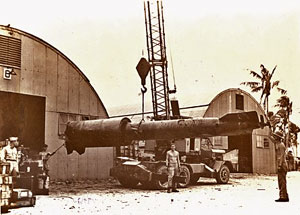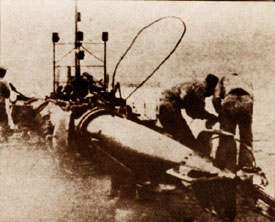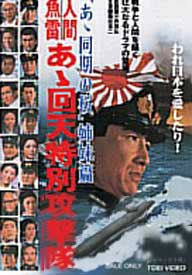First released for the twentieth anniversary of the end of hostilities in the Pacific, I saw the film over ten years after its release in a revival at an ethnic movie house, where I went regularly with the intent of seeing samurai movies, but was soon won over to all Japanese cinema, including gangster films, Meiji era romances, & war films. In the latter category Human Torpedoes; aka, Suicide Submarine (Ningen Gyoroi: Ah Kaiten tokubetso kogekitai!, Toei, 1968) left strong impressions.
This film truly shocked me at the time, as I'd never before heard of the Kaiten human torpedoes. I've since read a great deal about the various Special Attack Corps, including much about sub-lieutenant Sekio Nishina's desperate "invention" of the manned torpedo. Nishina became the very first "pilot" to be launched through a torpedo tube on a one-way mission, having with him the ashes of his close friend & "co-inventor" of the kaiten, Ensign Hiroshi Kuroki, who had died at the base during a kaiten test.
 On this page is a cut-away schematic of a kaiten, which suggests it was a roomier place to spend one's final hours within. I've also included two historical photographs which give a better idea of how small & cramped the space would be, certainly no room to be sitting up in a seat like the schematic indicates. On this page is a cut-away schematic of a kaiten, which suggests it was a roomier place to spend one's final hours within. I've also included two historical photographs which give a better idea of how small & cramped the space would be, certainly no room to be sitting up in a seat like the schematic indicates.
The primarily Japanese audience I saw this film with was already aware of the subject matter, & everyone was in tears throughout, knowing from the start what to expect. As soon as I figured out they were going to weld teenage boys inside torpedoes so there was no way ever to get out, I sank into my seat trying to hold back gasps of tragic horror.
Japanese war films tended to be anti-war films throughout the 1960s. Although this one is a tearjerker positing the extravagant heroism of Japanese youth, it is in great part about blind heroism & the extreme folly of wasted lives.
Kaiten means "heaven's turning." The earliest human-operated torpedoes did have hatches for escape, though the torpedo rider would even then have drowned, so there was no reason to try to get out of the thing. The best evidence is that no torpedo rider ever tried to get out, but invariably rode the bomb to the end. So later suicide torpedoes didn't bother to allow for any method of escape; they were simply welded shut after the youth climbed in, clutching to his heart whatever keepsake of his short life he brought with him.
 We follow young kaiten pilots (including Hiroki Matsukata) through their minimal training in volunteer service, their special last trip home to say good-bye to family members without revealing what they are going to do, their last taste of sake which for some was also their first taste since they were so very young, then sealed permanently inside the torpedoes. We follow young kaiten pilots (including Hiroki Matsukata) through their minimal training in volunteer service, their special last trip home to say good-bye to family members without revealing what they are going to do, their last taste of sake which for some was also their first taste since they were so very young, then sealed permanently inside the torpedoes.
There's a scene with a youth & the family patriarch, the patriarch played by the great actor Takashi Shimura. They are saying their last farewells without ever admitting they won't see each other ever again. If you've seen Shimura in Kurosawa's Ikiru (To Live!, Toho, 1952), then you know how incredibly sad he can appear to be. His farewell to the boy was one of the most unbearable things I've ever seen in a film.
No matter how pathetic the film makes this out to be, the historical facts are even more pitiful. In addition to the kaiten there were "suicide submarines" or "sea dragons" (Kairyu), which were two-man (or two-lad) mini-subs with warheads instead of torpedos, so that the entire sub was crashed into enemy ships.
Plus there were "Crouching Dragons" (Fukuryu) consisting of young men in hard-hat diving suits, armed with fifteen kilogram explosives held on the end of a bamboo stick. Most pathetic of all were the lads placed in floating oil-drums with a bomb & a paddle, who were supposed to paddle close to any passing ships & blow themselves up, but who probably were flooded & sank, or dehydrated & roasted to death in the sun, long before they had that opportunity.
One of the kaiten commanders is played by Koji Tsuruta, who himself as a youth really had volunteered as a kamikaze pilot. He was seated in his airplane at the end of the runway, ready to take off, when the Emperor came on the radio to announce surrender. So he lived to become a big film star famous for the sad look in his eyes. And when Koji Tsuruta weeps for the kaiten lads, you know he's not just acting.
History's Lt. Commander Zenji Orita, whose memoir of these events was translated for English publication in 1976, really was shocked & heartbroken over the command to launch tokko or suicide weapons of this kind. For the Japanese of that hour, the nation's very survival really did seem just that desperate.
Also in the "all-star cast" are Jushiro Konoe, Kotaro Aatomi, Junko Fuji, Shingo Yamashiro, & Shinichi "Sonny" Chiba.
OLD REVIEW,
Written Late 1982:
Introduction: While sorting through some old fanzines I found an undated issue of Ken Geki apparently from early 1983. This was an occasional newsletter/fanzine/catalog combination which I issued at intervals for a very few friends who shared my interest in Asian cinema.
In this one recovered issue I find that I had a long-forgotten commentary on Suicide Submarine written soon after having seen it at the theater, & it's different from my decades-later from-memory commentary. So the following text, with passing discussion of a second film seen around the same time, is reprinted below, unrevised.
 An effective tearjerker can really mess with the senses, & there's none better than Suicide Submarine. An effective tearjerker can really mess with the senses, & there's none better than Suicide Submarine.
It's about suicide torpedo squads called Kaiten meaning "whirling sun." Picture a seventeen year old boy climbing into the driver's seat of a live torpedo, clutching mommy's scarf to his chest, & screaming "Banzai!" as he blasts himself to smithereens against an American aircraft carrier. And Shirley Temple thought she had it bad because her mum got run over on her birthday.
I liked this film so much i went two weeks later to see a kamikaze pilot film with a young Sonny Chiba as the standard "ain't it sad to die when you're only seventeen" suicide mission hero. But he was playing such an insensitive jerk that every eye in the house was dry. Suicide Submarine on the other hand had the entire audience weeping buckets right from the start. Those young soldiers were so sweet & so brave, it was almost crippling to see.
Takashi Shimura had a small part as an aging father who suddenly realizes his son (Hiroki Matsukata) has a reason for wanting to drink sake with dad (the boy never liked sake before). The moment when celebration turns to understanding induces a tremendous sorrow, & when Takashi Shimura turns on the sad-face, there is no actor in the world who ever had a sadder one.
Another scene has the torpedo instructor (Koji Tsuruta, a famous yakuza star) dying of suffocation in a test run with a torpedo that won't surface. Later his young trainees read their instructor's notes, his final words scribed while he & a young trainee were dying. It's almost unbearable.
Still another heroic character, the seventeen year old orphan who is given a surrogate mother to be hugged by just before his mission, is the bravest little sucker in the whole world & too damned pretty to die, but die he does, without a moment's regret, while the old surrogate mother home in Japan prays at the side of the sea.
It may sound corny but that's beside the point. It's very effective. If you have the rare opportunity to see a couple films from this genre, don't hesitate, & take your handkerchief.
Oh, & behind me during this film, there was a caucasian man with his Japanse boyfriend. He kept whispering to his friend, "Inside the torpedo? They're inside torpedoes?" He couldn't believe it. Later, on the second film of the double bill, this same fellow saw his first yakuza swordfight, & grunted throughout, "Oh my god! Oh gosh!" in the most startled voice. I think these are common responses for virgin viewers.
The less effective film I mentioned in passing, seen a couple weeks later, was The Kamikazes (Minami Taiheiyo Nami Takashi, Toei, 1962), directed by Kunio Watanabe with the stars including both Ken Takakura & Koji Tsurta of yakuza films fame, plus Tatsuo Umemiya, Yoshiko Mita, Jo Mizuki, Naoka Kubo, Jun Tazaki, Tetsuro Tamba (who dies in a torpedo!), Sadako Sawamura, Shinichi Chiba, & Jun Tasaki.
The Kamikazes mainly follows the short military careers of three very young men, one who joins the Kaiten suicide torpedo missions, the other two the Kamikaze airplane pilots, all destined to splatter themselves into aircraft carriers.
copyright © by Paghat the Ratgirl
|

 On this page is a cut-away schematic of a kaiten, which suggests it was a roomier place to spend one's final hours within. I've also included two historical photographs which give a better idea of how small & cramped the space would be, certainly no room to be sitting up in a seat like the schematic indicates.
On this page is a cut-away schematic of a kaiten, which suggests it was a roomier place to spend one's final hours within. I've also included two historical photographs which give a better idea of how small & cramped the space would be, certainly no room to be sitting up in a seat like the schematic indicates. We follow young kaiten pilots (including Hiroki Matsukata) through their minimal training in volunteer service, their special last trip home to say good-bye to family members without revealing what they are going to do, their last taste of sake which for some was also their first taste since they were so very young, then sealed permanently inside the torpedoes.
We follow young kaiten pilots (including Hiroki Matsukata) through their minimal training in volunteer service, their special last trip home to say good-bye to family members without revealing what they are going to do, their last taste of sake which for some was also their first taste since they were so very young, then sealed permanently inside the torpedoes.